By las hermanas Cruz
Wednesday, May 18th, The Miami Book Fair, Miami Dade College and Imaginart Media Productions will host former Haitian president, Michel Martelly, at the MDC Wolfson campus for a book signing and discussion of Martelly’s new autobiography, Michel Martelly Autobiographie.
“Sweet Micky,” the former compa/pop singer turned president was “elected,” or rather installed by the U.S. in 2011, among valid accusations of election fraud. His presidency and resistance to leave office have been characterized by theft, corruption, delaying elections, and ruling by executive order.
Before Martelly left office, he released a gem of a song for Kanaval 2016. It’s called “Giver Her the Banana.” According to The Atlantic, “the uptempo track depicts the outgoing president as a doctor called on to insert various things into Liliane Pierre-Paul, a Haitian journalist and critic of his regime.”
Here are some of the lyrics:
Bring her a serum! Bring her a shot! Come with a pill for Little Lili!
Give her a Sweet Micky! Oh!
Take it out and put it in her behind!
Give her a banana!
Give her a banana with no skin!
Give her a banana with the skin on!
On its website, the Miami Book Fair claims to be recognized as the nation’s finest literary festival, alongside “the Center for Writing and Literature @ Miami Dade College, a cultural and academic initiative that promotes the advancement and appreciation of literature throughout the year.”
We are curious to know how Michel Martelly fits into this mission.
Admission to the event is free…. Well, free with the purchase of Martelly’s $50 autobiography.
As Martelly further cashes in on his presidency of corruption, most Haitians struggle for basic human rights – clean water, food, shelter, clothing, education, employment – and wages that afford this.
Wage Struggles & the Fight against Exploitation
On Thursday, May 11, garment workers shut down the SONAPI Industrial Park in Port au Prince to demand increased wages. These efforts were organized by the Port Au Prince trade union, SOTA-BO (Union of Textile & Apparel Workers), along with PLASIT-BO, an association of autonomous textile trade unions in Haiti, affiliated with Batay Ouvriye (Workers Fight).
The mobilization started in the morning with a work stoppage, followed by a sit in. The national police were called as more workers joined the mobilization, demanding 500 gourd ($7.94 for an eight-hour workday). The current minimum wage, when it’s actually paid, is between 200 and 250 gourd, around $3/3.50 for 8 hours. Garment workers have been fighting for an increased minimum wage for years now, facing fierce resistance from factory owners and the brands they produce for.
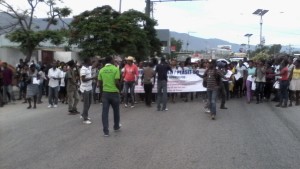 In response to this action, on Saturday, May 14th, Premium Apparel factory owner, Clifford Apaid, fired Telemarque Pierre, the General Coordinator of SOTA-BO and spokesperson for PLASIT. Further, ADIH (Haitian Industrialists Association), Better Work Haiti (a labor practices monitoring agency), and the USDOL (U.S. Department of Labor) have denounced “acts of violence” they claim were committed against property and people during the day of the mobilization.
In response to this action, on Saturday, May 14th, Premium Apparel factory owner, Clifford Apaid, fired Telemarque Pierre, the General Coordinator of SOTA-BO and spokesperson for PLASIT. Further, ADIH (Haitian Industrialists Association), Better Work Haiti (a labor practices monitoring agency), and the USDOL (U.S. Department of Labor) have denounced “acts of violence” they claim were committed against property and people during the day of the mobilization.
What about the daily violence of wage theft, harassment, and threats for organizing for your rights? What about the violence of not being paid enough to eat? This is repression in the interest of profit.
 Every day, when we get dressed, we wear the products of exploitation. Hanes, Gildan, Levi’s, Gap, Target, Kohl’s, WalMart, JC Penney, and Children’s Place are some familiar brands produced in Haiti. Haitian garment workers live in crushing poverty and are paid the lowest wages in the Western Hemisphere. These wages are mostly absorbed by workers’ transportation costs, to and from work, pushing them into debt to afford the basics – food, water, rent.
Every day, when we get dressed, we wear the products of exploitation. Hanes, Gildan, Levi’s, Gap, Target, Kohl’s, WalMart, JC Penney, and Children’s Place are some familiar brands produced in Haiti. Haitian garment workers live in crushing poverty and are paid the lowest wages in the Western Hemisphere. These wages are mostly absorbed by workers’ transportation costs, to and from work, pushing them into debt to afford the basics – food, water, rent.
Wage theft, harassment, and unwarranted firings for organizing are the norm in factories.
In 2013, Workers Rights Consortium found that the majority of workers in Haiti’s garment industry are being denied nearly a third of the wages they are legally owed due to widespread wage theft. A previous report found that every single one of Haiti’s export garment factories was illegally shortchanging workers.
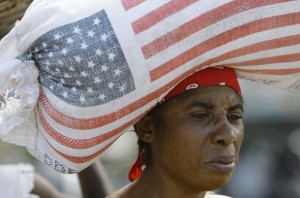 Garment assembly is tied to export-based economic development, pushed onto Duvalier in the 1980s by main sources of loans, then and now: U.S. Agency for International Development (AID), the World Bank, and the Inter-American Development Bank. With Haiti’s “comparative advantages”—cheap labor, hard-working people, proximity to the U.S., and year round growing season—USAID focused development on agribusiness and assembly industries. Monocrops and exports replaced subsistence and local production, forcing rural Haitians into urban slums, to buy rice imported from the US.
Garment assembly is tied to export-based economic development, pushed onto Duvalier in the 1980s by main sources of loans, then and now: U.S. Agency for International Development (AID), the World Bank, and the Inter-American Development Bank. With Haiti’s “comparative advantages”—cheap labor, hard-working people, proximity to the U.S., and year round growing season—USAID focused development on agribusiness and assembly industries. Monocrops and exports replaced subsistence and local production, forcing rural Haitians into urban slums, to buy rice imported from the US.
In theory, assembly industries absorb displaced farmers, providing jobs to them and existing urban unemployed. But Max, a member of SOTA-BO, describes the reality. “When we get our wages, we need to be able to send our kids to school, pay rent, eat, healthcare. We don’t have these. The wages they give us have no value.”
The Solidarity Center conducted research in 2014 to reassess the cost of living for export apparel workers in Port-au-Prince. “The High Cost of Low Wages in Haiti” concluded that, based on a standard 48-hour work week, Haitian workers should be paid at least 1,006 gourdes per day to adequately provide for themselves and their families.
Haiti’s export-based economy is bound to cheap labor and exploitation. Foreign companies pay no taxes. Protective tariffs do not exist. Additionally, the U.S. lifted tariffs on goods shipped from Haiti to U.S. through 2020 (HOPE II and HELP Acts). According to secret State Department cables exposed by Wikileaks, the US Embassy and USAID worked with contractors for Fruit of the Loom, Hanes and Levi Strauss to keep wages low. In this climate, foreign investors profit, while no revenue is created for social programs like healthcare or education. None of the massive profits generated are being invested into Haiti.
After the 2010 earthquake that devastated Port Au Prince, Martelly took office in 2011 with the motto, “Haiti is open for business.” With the key “comparative advantage” of cheap labor, and the unleashing of tax holidays and subsidies, the goal was to attract foreign investment under the claim of “developing” or “rebuilding” the local economy, post-earthquake. Expansion of the assembly/textile industry and Free Trade Zones has been integral in this “development” plan, along with tourism and agri-business. In conjunction with the IMF, World Bank, Inter-American Development Bank, and USAID, the Clinton Bush Haiti Fund has spearheaded much of the effort to “develop,” aka exploit, Haiti through private enterprise and through NGO, charity and relief enterprises.
According to a report by The Dominion “After the devastating earthquake in Haiti in 2010, the international community pledged an unprecedented $5 billion—at the time, the largest pot of post-disaster reconstruction money ever pledged. However, the centerpiece of this post-earthquake reconstruction fund was not the creation of jobs, rebuilding of houses, nor the construction of water and sanitation infrastructure to prevent the spread of and death from the worst cholera epidemic in modern history, but rather to build a giant, Korean-run, $300 million industrial park for apparel manufacture in Caracol, far away from the earthquake-affected area and at the heart of an environmentally protected region, which is also home to some of the most fertile agricultural land in Haiti.”
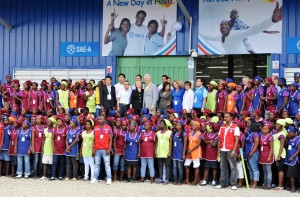 The Bush Clinton Haiti Fund claims “We have used these generous donations to help Haitians transform their own country. In the immediate aftermath of the earthquake, the Fund supported emergency needs. We then transitioned to promoting smart, sustainable economic development.”
The Bush Clinton Haiti Fund claims “We have used these generous donations to help Haitians transform their own country. In the immediate aftermath of the earthquake, the Fund supported emergency needs. We then transitioned to promoting smart, sustainable economic development.”
Imperialism
Imperialism is the natural expansion of capitalism. When capital, ruled by its growth imperative, inevitably reaches limits to the accumulation of surplus value within a territory (nation, or social formation) it already controls, it must expand beyond its borders to conquer other areas. It uses the state(s) of its home base(s) to wage politics (up to and including war, the most extreme form of politics) on other social formations—to subjugate the ones it can, as well as to compete with others over how to carve up the world.
Though empires have existed before capitalism, imperialism is a specific stage of capitalism. Colonialism developed into imperialism with the internationalization of monopoly capital. More than simply an aggregate of national economies, imperialism is an integrated world system that is linked to a qualitatively increased socialization of production, and the complete partition and control of the world by the capitalist class.
We – progressives and radicals – in the U.S. must understand the global relations of imperialism. It’s what moves the entire world around us, from the clothing on our backs, the food on our plates, to the ideas we have about the world.
We cannot affect this arrangement with our consumption choices. There are no guilt-free products, made outside of this global arrangement. Instead, those of us living inside the U.S.—the most violent and destructive imperialist power in the world—must take a stand against all forms of imperialism, and build organizations that work in solidarity with people’s and workers’ struggles internationally. We must increase our own power to fight against the capitalist system that dominates the entire world for the benefit of a few.
Let’s build a movement of progressives, laborers, students, professors, artists, intellectuals to fight against imperialist domination and to support the fight against exploitation in Haiti, and in all countries, including the U.S.
Rapid Response Network
So, back to Sweet Micky in Miami. Don’t waste your time and money to hear a corrupt, misogynist pawn of imperialism speak about a book he likely didn’t write himself. Join the fight against exploitation!
The Rapid Response Network (RRN) is an autonomous network of people that supports the struggles of workers fighting repression and exploitation. The network is not tied to any political parties or NGO’s. The goal of the RRN is to publicize and support these struggles under workers’ guidance and in their interests.
Support Haitian garment workers’ demands – 500 gourdes ($11.50/day)!
Stand up for Telemarque Pierre – SOTA and PLASIT union organizer – who was fired for organizing for a fair wage!
PLASIT will be sending an update soon on how folks in the U.S. and internationally can be of concrete support.

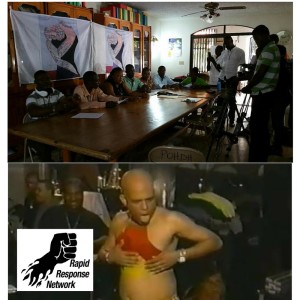
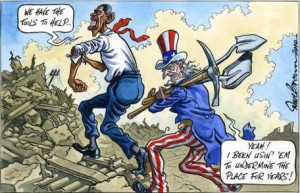
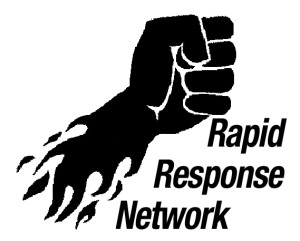

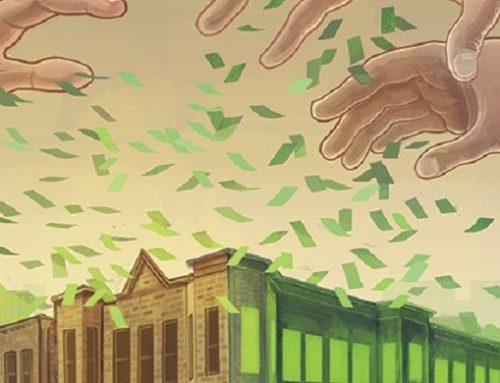

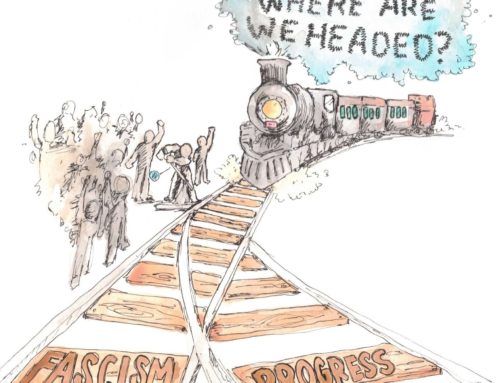

Good post, keep